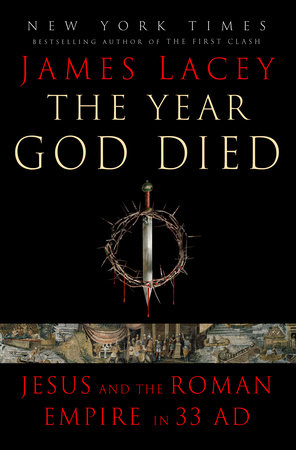
The Year God Died
Jesus and the Roman Empire in 33 AD
James Lacey
Hardcover
May 20, 2025 | ISBN 9780593355220
AmazonBarnes & NobleBooks A MillionBookshop.orgHudson BooksellersPowell'sTargetWalmart
Ebook
May 20, 2025 | ISBN 9780593355237
AmazonApple BooksBarnes & NobleBooks A MillionGoogle Play StoreKobo
About the Book
“Skillfully guides readers on a journey through the complexity and tumult of the Roman occupation of first-century Judea and its inevitable collision with the Jesus Movement.”—Dr. T. J. Wray, professor of religious and theological studies and author of Good Girls, Bad Girls of the New Testament: Their Enduring Lessons
In late 31 AD, after the Roman senators murdered Lucius Sejanus, the Roman Emperor Tiberius's closest confidant, the Empire was forever changed. If Sejanus had not been murdered, Jesus would never have been crucified.
This profound connection between the lives of Sejanus and Jesus is the first of many revelations in this startling reexamination of the Roman world in which Jesus walked. With new evidence and meticulous research, Dr. James Lacey weaves a majestic and accurate description of who Jesus was.
The Year God Died contradicts longstanding historical beliefs to reveal the most comprehensive and accurate view of the New Testament. Lacey explains how the events in Rome drove events in Judea—which is directly linked to Jesus' crucifixion. He uncovers a vibrant and rich world, but one still coming to grips with the reality of Roman power. He introduces ten-year-old Boadicea, who is destined to lead Britain’s tribes in a great revolt against Rome. He depicts Varus marching his legions past a four-year-old Jesus on his war to Jerusalem. And he describes how Herod prospered by appeasing some of the most dangerous people in history—Pompey, Julius Caesar, Mark Anthony, Cleopatra, and Augustus.
In this sweeping chronicle, Lacey dissects reams of misinformation to reveal, for the first time, Jesus, as he was born and lived within the grand spectacle of the Roman world.


